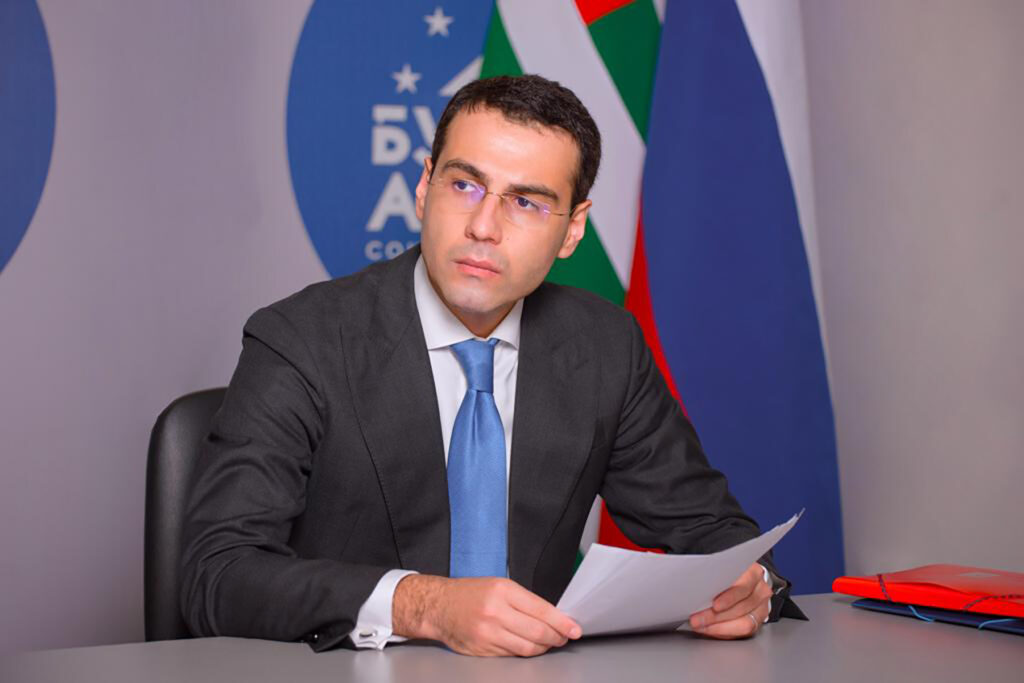Abkhazia’s Foreign Ministry has denied reports that Foreign Minister Inal Ardzinba submitted his resignation on Monday night, with the minister reportedly later telling colleagues that his announcement was a ‘joke’. On the following day, a number of senior officials were dismissed.
Independent Abkhazian Telegram channel D News was the first to report Ardzinba’s resignation on the evening of 4 September, claiming he had told his team he was leaving his post and ‘returning to Russia’.
The following morning, a decree was signed dismissing the head of the Presidential Administration, Jansukh Nanba, and Deputy Prime Minister, Sergei Pustovalov, with no information provided for the reasons for their dismissals.
Abkhazia’s Foreign Ministry only issued an official response to reports of Ardzinba's resignation that afternoon, stating that the claim did ‘not correspond to reality’.
Shortly afterwards, Russian state propagandist Margarita Simonyan wrote on Telegram that Ardzinba had confirmed to her that he was not leaving his post.
However, employees of the ministry told OC Media on condition of anonymity that Ardzinba had said his goodbyes to them on 4 September, but the following day returned, claiming that his announcement of his departure was a ‘joke’.
Presidential punishment or a Ukrainian mission
Rumours and speculation regarding the reason for Ardzinba’s alleged resignation have circulated since the news first emerged.
One prominent theory explaining the incident relates to government dissatisfaction with his performance.
In early July, Ardzinba travelled to Northern Cyprus, telling reporters that he was visiting in an official capacity. However, sources within the Foreign Ministry state that Ardzinba was on a private trip, but announced to media that Abkhazia was looking into investment and economic cooperation with Northern Cyprus after his arrival.
Ardzinba was also reportedly accompanied by Russian Senator Alexander Nekrasov, with Ardzinba claiming that Nekrasov had described Abkhazia as ‘much more attractive in terms of tourists and prospects’ than Northern Cyprus.
Sources within Abkhazia’s government told OC Media that this was poorly received by Russia, with complaints regarding Ardzinba reaching Abkhazia’s President Aslan Bzhaniya, who they said consequently banned Ardzinba from travelling outside Abkhazia. In this version of events, Ardzinba submitted his resignation in response to the news.
A second theory in circulation is that Ardzinba submitted his resignation because the Kremlin had asked him to work in Moscow on issues relating to Ukraine.
Prior to entering Abkhazian politics, Ardzinba worked in Russia’s Presidential Administration, where, between 2014 and 2018, he led a department working on socio-economic relations with Ukraine.
In 2015, Ardzinba was accused by Ukrainian prosecutors and Ukraine’s Security Service of leading efforts to undermine the country’s territorial integrity and conducting terrorism-related offences within Ukraine, with Kyiv issuing an international arrest order for Ardzinba later that year.
A number of pro-Kremlin Telegram channels claimed on Sunday that Ardzinba would be returning to Moscow to conduct ‘informational-psychological operations’ in Ukraine.
No reliable confirmation of either theory has yet been made public.
Some have speculated that former foreign minister Vyacheslav Chirkba would take on the role in Ardzinba’s stead.
Ardzinba’s public reputation has been contentious at best since taking office in 2021. This has in part related to his hostile attitude towards international organisations operating in Abkhazia, which impacts many civil society organisations working in the region.
He is also known to support deeper integration with Russia, which many in Abkhazia consider a threat to its sovereignty.
Ardzinba has expressed support for the ratification of the controversial Pitsunda state dacha agreement and law on apartments, both of which are seen by many as giving the Russian state and its citizens more power in Abkhazia. He is also known to be on friendly terms with Russian state propagandists Vladimir Solovyov and Margarita Simonyan.
For ease of reading, we choose not to use qualifiers such as ‘de facto’, ‘unrecognised’, or ‘partially recognised’ when discussing institutions or political positions within Abkhazia, Nagorno-Karabakh, and South Ossetia. This does not imply a position on their status.




 6 September 2023
6 September 2023



